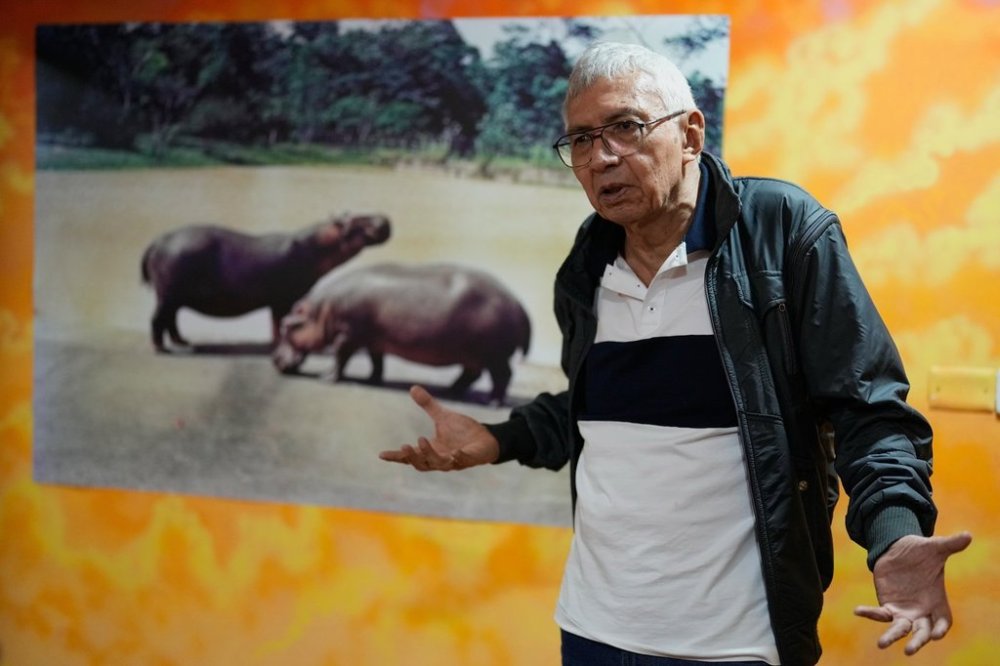World
Colombian Artists Transform Pablo Escobar’s Hippos into Political Art

Colombian artists are exploring the legacy of Pablo Escobar through a unique exhibition that highlights the invasive hippos he introduced to Colombia in the 1980s. The exhibit, titled “Microdoses to Tame the Inner Hippopotamus,” features works from 20 artists, including a striking portrait by photographer Édgar Jiménez. His piece, “Adam and Eve,” captures two of the first hippos brought to the country by the notorious drug kingpin.
Jiménez, who served as Escobar’s personal photographer, recalls capturing the image from just four meters (13 feet) away, unaware of the dangers posed by the animals. The hippos, originally acquired from a zoo in the United States, have since multiplied to over 160 in the wild, posing significant ecological challenges as they have been classified as an invasive species in Colombia.
Art as Political Commentary
Curated by Santiago Rueda, the exhibition seeks to provoke thought rather than moral judgment. Rueda emphasizes the complexity of using Escobar’s hippos as a lens for political critique, reflecting on the “narco-madness” that has permeated Colombian culture. One standout piece, titled “The Great Narco Ark” (“La gran narco arca”) by artist Carlos Castro, depicts Escobar alongside various wild animals, alluding to the biblical Noah’s Ark.
Rueda explained that the exhibit serves as a reminder of the excesses associated with Escobar’s reign and how those themes resonate globally today. Another artwork features a hippo named “El Gordo” (The Fat One), which humorously offers a reward of up to $264,000 for its capture. Artist Manuel Barón describes this work as a commentary on the past pursuits of drug cartels and the absurdity of the ongoing legacy of Escobar.
The Irony of Hippo Waste
The exhibition also includes innovative pieces that highlight the irony of the hippos’ existence in Colombia. Artist Camilo Restrepo has discovered that hallucinogenic mushrooms can be cultivated in hippo dung, creating a striking juxtaposition. Restrepo pointed out that the financial success of drug trafficking allowed Escobar to import exotic animals, and now, their waste serves a new purpose in the drug economy.
“The irony is profound,” Restrepo stated, “that the failure of the war on drugs resulted in wealth for traffickers, allowing them to introduce an entire zoo into Colombia. Meanwhile, the hippos remain a part of the landscape.” The artist noted that the mushrooms grown in their dung “dissolve the ego,” contrasting sharply with cocaine, which he described as “elevating it.”
The exhibition opened on Thursday at Casa Échele Cabeza, a project aimed at promoting drug regulation and harm reduction, managed by the nonprofit organization Accion Técnica Social. This initiative highlights the ongoing dialogue surrounding drug policy in Colombia and the broader implications of Escobar’s legacy.
As Colombian artists continue to engage with the complexities of their history, this exhibition stands as a testament to how art can reflect and critique societal issues, transforming the narrative around a figure as controversial as Pablo Escobar.
-

 Science3 months ago
Science3 months agoToyoake City Proposes Daily Two-Hour Smartphone Use Limit
-

 Health3 months ago
Health3 months agoB.C. Review Reveals Urgent Need for Rare-Disease Drug Reforms
-

 Top Stories3 months ago
Top Stories3 months agoPedestrian Fatally Injured in Esquimalt Collision on August 14
-

 Technology3 months ago
Technology3 months agoDark Adventure Game “Bye Sweet Carole” Set for October Release
-

 World3 months ago
World3 months agoJimmy Lai’s Defense Challenges Charges Under National Security Law
-

 Lifestyle3 months ago
Lifestyle3 months agoVictoria’s Pop-Up Shop Shines Light on B.C.’s Wolf Cull
-

 Technology3 months ago
Technology3 months agoKonami Revives Iconic Metal Gear Solid Delta Ahead of Release
-

 Technology3 months ago
Technology3 months agoApple Expands Self-Service Repair Program to Canada
-

 Technology3 months ago
Technology3 months agoSnapmaker U1 Color 3D Printer Redefines Speed and Sustainability
-

 Technology3 months ago
Technology3 months agoAION Folding Knife: Redefining EDC Design with Premium Materials
-

 Technology3 months ago
Technology3 months agoSolve Today’s Wordle Challenge: Hints and Answer for August 19
-

 Business3 months ago
Business3 months agoGordon Murray Automotive Unveils S1 LM and Le Mans GTR at Monterey









